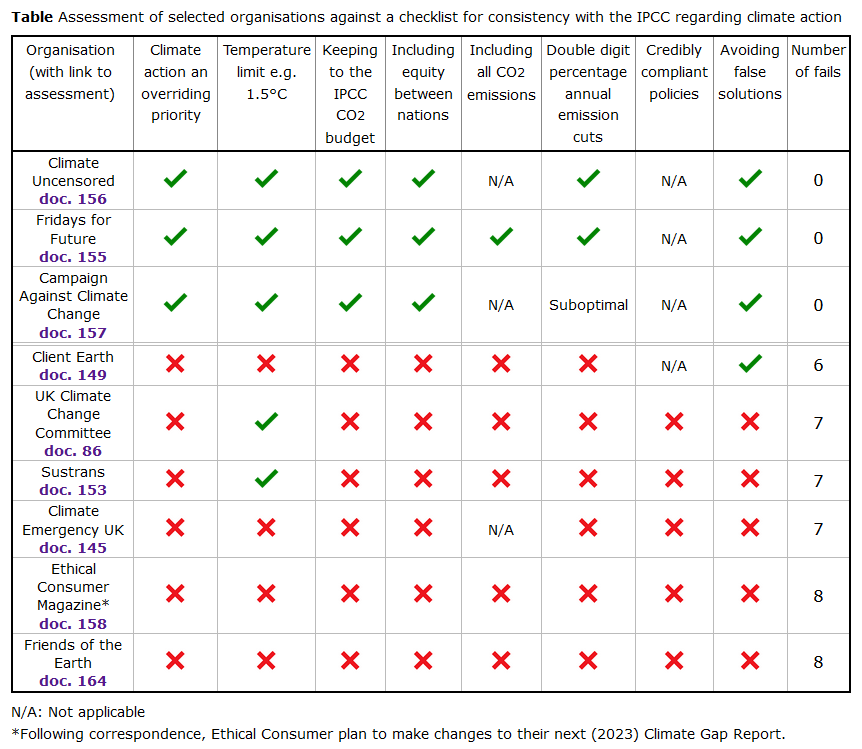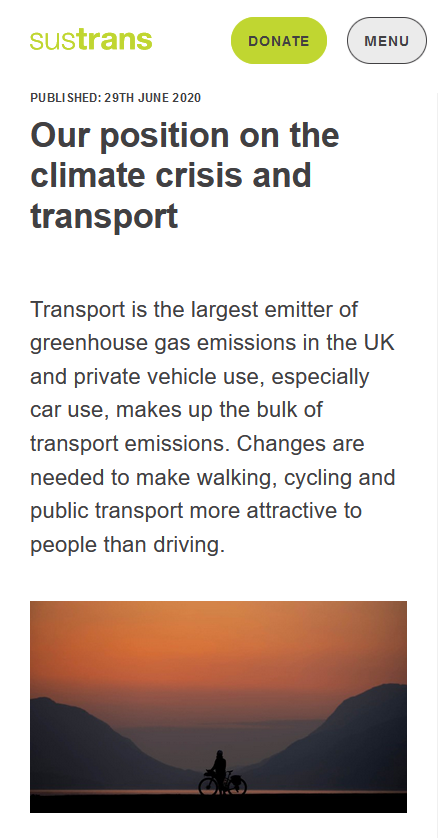
Sustrans: Climate denial
Sustrans is a UK charity, which has the aim of "making it easier for people to walk and cycle".
It has a position statement on climate change and transport. This position statement is assessed here by a checklist for consistency with the IPCC regarding climate action.
The findings are that the Sustrans position is not consistent with the climate science and what the IPCC says needs to be done.
Sustrans is a part of and contributing to the widespread climate implicatory denial.
If it want to help limit global warming to 1.5°C, Sustrans should revise its position statement and its policies, and help publicise the Tyndall Climate Centre reports for local authorities that indicate the urgent radical change that is needed.
It has a position statement on climate change and transport. This position statement is assessed here by a checklist for consistency with the IPCC regarding climate action.
The findings are that the Sustrans position is not consistent with the climate science and what the IPCC says needs to be done.
Sustrans is a part of and contributing to the widespread climate implicatory denial.
If it want to help limit global warming to 1.5°C, Sustrans should revise its position statement and its policies, and help publicise the Tyndall Climate Centre reports for local authorities that indicate the urgent radical change that is needed.
Summary table Assessment against a checklist for consistency with the IPCC regarding climate action
| Climate action an overriding priority | Temperature limit e.g. 1.5°C | Keeping to the IPCC CO2 budget | Including equity between nations | Including all CO2 emissions | Double digit percentage annual emission cuts | Credibly compliant policies | Avoiding false solutions | Number of fails | |
|---|---|---|---|---|---|---|---|---|---|
| Sustrans |  |  |  |  |  |  |  |  | 7 |

This can be compared with the assessments for other groups via the summary table in document 154.
The organisation
Sustrans (https://www.sustrans.org.uk) is a UK charity with a name derived from sustainable transport. In explaining its aims, its website states "We're the charity making it easier for people to walk and cycle" [1].Messaging assessed
 Sustrans has a statement on climate change: Our position on the climate crisis and transport [2]. This document is an assessment of that position statement using a checklist to assess implicatory denial - see document 138.
Sustrans has a statement on climate change: Our position on the climate crisis and transport [2]. This document is an assessment of that position statement using a checklist to assess implicatory denial - see document 138.There are concerns that climate denial in various forms is widespread throughout society [3]. Some individuals and organisations accept the basic science of climate change, and the interpretation that the climate is changing due to burning of fossil fuels by mankind - but deny or minimise the psychological, political, and moral implications of the facts, fail to accept responsibility for responding, and fail to act in the way that the information implies, which is termed implicatory denial by sociologists [3].
Assessment
A summary of the assessment is given at the top of this page. Details of the checklist elements are given here.1. Is climate action an overriding priority, on the basis of e.g. the gross injustice?
NO - there is no mention in the position statement of the international injustice or of other factors that make climate change an emergency.
2. Is a limit to global warming specified, generally 1.5°C?
YES - a limit of 1.5°C is clearly stated.
3. Is there adherence to the IPCC CO2 budget? Is the mechanism for limiting global warming clearly stated to be limiting further total global CO2 emissions to the CO2 budget specified by the IPCC?
NO - there is only mention of halving global emissions by 2030, and net zero by 2050.
4. Is equity between nations incorporated? Are the implications of the international commitments to global equity properly taken into account, i.e. that developed nations cut emissions faster than the global average?
NO - there is no mention of global equity and the need to reduce UK emissions faster than the global average.
5. Are all CO2 emissions included, particularly those embodied in imports and exports and those from aviation and shipping?
No - the position statement endorses the UK Government's carbon budgets which ignore imports and exports.
6. Is the size of appropriate annual emission cuts specified e.g. double digit percentage cuts in developed countries?
NO - the figures for annual emission cuts are much lower, and there is no mention of the Tyndall reports for local authorities [4] which would be a useful resource for local campaigners.
7. Credibly compliant policies Do any policies discussed comply with this timescale for urgent radical cuts in emissions?
NO - the policies discussed do not comply.
8. Are false solutions avoided?
NO - there is discussion of a switch to electric vehicles having a significant role, but the UK's per-capita share of the global CO2 budget runs out at the end of 2024 (see document 33), and so much more radical solutions are needed.
In summary, the Sustrans position statement fails on six out the seven points on the checklist.
Comment
The findings are that the Sustrans position statement is not consistent with the climate science and what the IPCC says needs to be done.A key flaw is omission of global equity, that developed countries cut emissions faster than the global average, but this is a vital part of the Paris Agreement - see document 122.
Sustrans is a part of and contributing to the widespread climate implicatory denial.
If it wants to help limit global warming to 1.5°C, Sustrans should revise its position statement and its policies, and help publicise the Tyndall Climate Centre reports for local authorities [4] that indicate the urgent radical change that is needed. These are a useful resource for local planning and local campaigners.
References
| [1] | https://www.sustrans.org.uk/about-us/ (accessed 10.2.23) |
| [2] | Sustrans (2020) Our position on the climate crisis and transport https://www.sustrans.org.uk/our-blog/policy-positions/all/all/our-position-on-the-climate-crisis-and-transport (accessed 10.2.23) . |
| [3] | Iain Walker and Zoe Leviston (2019) There are three types of climate change denier - and most of us are at least one The Conversation https://theconversation.com/there-are-three-types-of-climate-change-denier-and-most-of-us-are-at-least-one-124574 |
| [4] | Tyndall Centre The Tyndall carbon budget tool (2019) https://carbonbudget.manchester.ac.uk/reports/ |
First published: 10 Feb 2023
Last updated: 19 Aug 2023

 ✖
✖